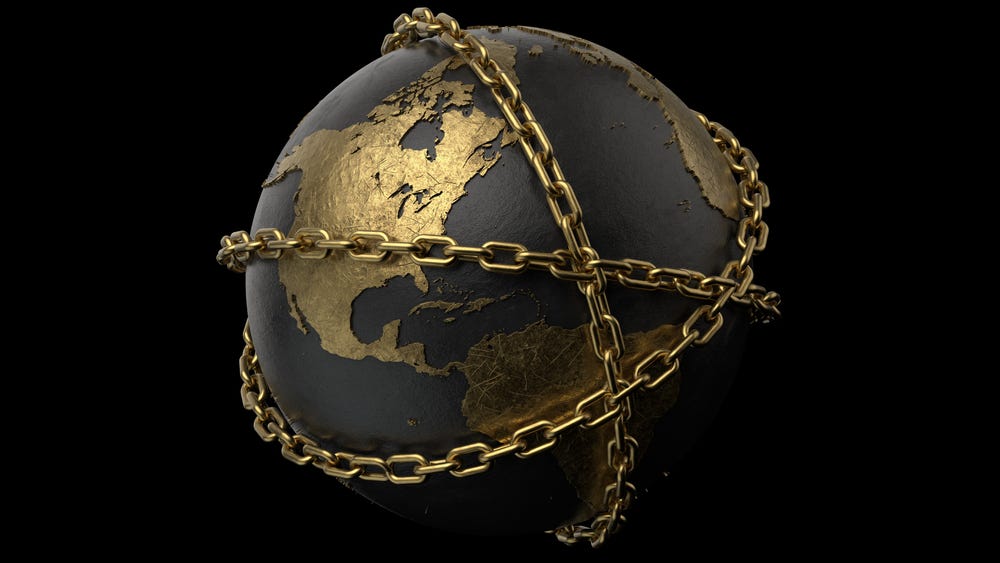E-Pluribus | January 5, 2022
The decline and fall of Progressive America, how the teaching of history can be improved, and is the free world becoming simply free-ish?
A round up of the latest and best writing and musings on the rise of illiberalism in the public discourse:
Joel Kotkin: Is this the end of progressive America?
Despite its continued dominance within many contemporary institutions, Joel Kotkin at Unherd posits that progressivism in America is showing some serious cracks. Kotkin says that while the elite still hold sway in urban areas, the broader population trends out of those areas spells trouble for the progressive movement.
The great paradox of progressivism is that nowhere are its shortcomings more evident than in its geographic heartland: the dense urban centre. Conventional wisdom has dictated that America’s high-tech economic future will be shaped in dense urban areas, where superstar companies stand the best chance of recruiting superstar employees.
But while the upper crust of the labour force continue to head to the dense urban cores, on the ground people are moving in the other direction. Across the high-income world, not only in America but Europe as well, the vast preponderance of growth has taken place in suburbs and exurbs. In the last decade over 90% of all US metropolitan population growth and 80% of job growth took place on the periphery. On the ground, then, the progressive dream is withering.
The pandemic has greatly enhanced these trends, with downtown neighbourhoods recovering far less quickly than suburban, exurban, and small towns. But even if these changes are not permanent, at least not entirely, city residents will still have to contend with another pitfall of the progressive agenda: rising crime. Twelve American cities have experienced record homicides this year; all are ruled by Democratic, often progressive, leaders, many of whom explain away crime and excused, even praised, the looting and mayhem caused by protestors in the summer of 2020.
Yet despite this visceral impact on urban neighbourhoods, it is in education that our new hegemony could have its most long-lasting impact. The West’s new educational mandarins, increasingly strident and increasingly influential, have no use for our liberal inheritance, which they consider little more than a screen for racists and misogynists.
[…]
Yet perhaps nothing is more ironic, and potentially dangerous, than the takeover of the corporate suite by progressive ideology. Traditionally, the dispersion of ownership and the conflicting views of entrepreneurs and inheritors fuelled the dynamism of democracy: you had far-Left businessmen like George Soros and doctrinaire Right-wingers like the Kochs in competition. They fought it out, and sometimes even aligned. But they came from diverse viewpoints.
Today this diversity of viewpoints is being obliterated by design, with corporate behaviour now married closely to the notion of the “great reset” and “de-growth”: an economy where improving conditions for the masses is replaced with lowering carbon emissions and diversity tokenism. Such standards, of course, do not apply to snotty private schools attended by their offspring, or areas that are home to their mansions.
Read the whole thing.
Michael Tolhurst: To Calm the Storm Over the Teaching of History, Look to These Three Values
“Critical race theory” and the New York Times’s 1619 Project, among other things, have helped fuel a debate over how and what our children are being taught. Writing for Discourse Magazine, Michael Tolhurst of George Mason University says that optimism, inclusion and honesty are three values everyone should be able to agree on for providing a fair and balanced look at our past for those who hold the future of our country in their hands.
As a hobby, I collect old textbooks, particularly those on civics and American history. What characterizes these books, especially ones from the late 19th and early 20th centuries, is their optimism about America and Americans. Reading them is a genuine culture shock, given today’s cynical and pessimistic milieu.
When the greatest generation—the generation that went on to lead America through World War II and the Cold War—was in school, the curriculum was very big on American potential and American freedoms. We do want people to feel good about the country and their community. We do not want people to feel alienated from their society. We also want Americans to feel hopeful about the future. A teaching of civics and history that paints our country as irredeemably bad is going to be rejected by citizens who like their country.
[…]
If what we are looking for is an inclusive and optimistic rendition of history, we also need one that is as close to true as possible, and we arrive at that truth by checking our interpretations with others. We arrive at that truth by comparing our perspective with the perspectives of others. This is not to say all perspectives are of equal weight—empirical facts put hard constraints on what is plausible to believe.
Read it all.
Brian Stewart: The Free-ish World
Brian Stewart of Quillette reviews World in Danger: Germany and Europe in an Uncertain Time by Wolfgang Ischinger, published in November 2020. Ischinger, former German diplomat and chairman of the Munich Security Conference, chronicles the continued decline of Western influence and values, noting the emergence of Trump, the rise of China and the weakness of Europe, among other trends. However, Stewart notes that Ischinger is short on answers for the problems he points out.
Facing the sudden deterioration of a world order nearly a century in the making, the boldest minds in Europe are beginning to stir from their prolonged slumber and demand a new realism that acknowledges military instruments of power, without which diplomacy will be anemic. In short, Europe is no longer happily ensconced in the immediate post-Cold War era or fixated on the debate over stimulus and austerity that defined its last decade. The stark dilemmas involving the material stability of the eurozone or the political development of the European Union have by no means vanished from view, but they’ve been superseded by larger questions about the very purpose of the European project.
History has well and truly returned, in other words, after the briefest and most tantalizing of disappearances. Ischinger fingers the Trump administration for revealing and aggravating the fragile condition of the “entire liberal world order.” Who could quibble with his contention that, before 2017, “nobody could have known that the new American president, of all people, would be the one to challenge” the economic order of free trade, to say nothing of “the Western canon of values and the principle of collective security anchored in Article 5 of the NATO treaty.” And without a stalwart liberal superpower guarding democracy’s ramparts in Europe and much of the world beyond, this order looks desperately vulnerable.
[…]
Ischinger recounts the sorry record of European states (Merkel’s was scarcely an exception) on the Syrian uprising. Most governments vociferously and “pompously” called for Bashar Assad’s ouster, Ischinger notes, but failed “entirely” to muster “the strategic resolve to pursue this goal.” As a result, the unfathomably repressive regime in Damascus has emerged from Syria’s failed revolution in a position of renewed strength, and is presently reclaiming its status in the order of nations. Ischinger blushes with shame at Europe’s inability even “to threaten the use of military force” for humanitarian or strategic purposes in the world. “We prefer to leave that to others,” he complains, “but to no good.”
Alas, there is no reason to believe this state of affairs will change anytime soon. One of the problems with the European approach to power is practical: grossly insufficient defense outlays. The paltry percentages of national budgets earmarked for defense across the continent make credible projections of power impossible. This became painfully evident in 2011, when French and British warplanes ran out of bombs after a few dozen sorties in Libya, leaving the mission’s fate in American hands.
Read it all here.
Around Twitter
A thread from Glenn Greenwald on mainstream media’s contempt for new media:
Early in the pandemic, efforts to point out potential harm to children from lockdowns was often shouted down as wanting people to die. The New York Times, via David Leonhardt, is finally giving the issue the attention it deserves. Excerpts here, but click on the first tweet below to read the full thread":
Finally, a good catch from Nicholas Christakis on speech suppression in China:













